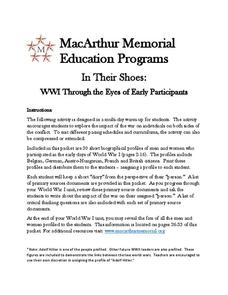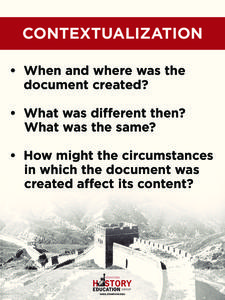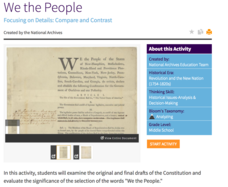Council for Economic Education
Business in the Middle Ages: Working in a Guild
Long before modern labor unions, guilds worked to ensure that workers had a fair wage. But, in medieval Europe, they also cooperated with the government. Using a simulation and primary source analysis, young scholars become hatters in...
National Constitution Center
Federalism, the Commerce Clause, and the Tenth Amendment
How do the state and federal governments relate to each other? The Constitution has a lot to say about that! Using an interactive online tool, pupils explore the Tenth Amendment. They apply their knowledge to political cartoons and news...
US National Archives
WWII: Western Europe 1939-45 – Invasion
Without the benefit of history, Western Europe in the 1940's had no idea what was about to befall them. Class members use primary sources, including political cartoons, videos, and internal documents, to analyze how much of a threat...
MacArthur Memorial
In Their Shoes: WWI Through the Eyes of Early Participants
Several social activities provide showcase the perspective of many prominent figures in World War I history. Students read an assigned case study about a memorable person and complete several activities to further understand this...
Los Angeles Unified School District
Capitalism and Socialism
Capitalism, socialism, communism ... these may seem like a whole bunch of isms to your scholars. High schoolers won't confuse them after completing an informative resource. Your class masters how to use primary sources to...
US National Archives
WWII: Asia 1939-45 – Burma
Because World War II encompassed most of the globe in one way or another, many pivotal battles and events are not as visible in the history books, leaving veterans of these conflicts feeling overlooked by more famous skirmishes. High...
US National Archives
Eastern Europe 1939-45 — Ukraine
Was Joseph Stalin desperate or exaggerating the USSR's need for assistance on the Eastern Front in 1942? History students examine two differing opinions on Stalin's position and the reality of the Eastern Front just three years before...
Stanford University
Corroboration
How do historians corroborate the information in a primary source document? They use the questions features on this poster!
K12 Reader
Two Viewpoints of the Same Event: Lee Surrenders to Grant, 1865
How did Union General Ulysses S. Grant view the surrender of Confederate General Robert E. Lee in 1865, which effectively ended the United States Civil War? After reading an excerpt from Grant's autobiography, your young historians will...
US National Archives
WWII: Western Europe 1939-45 – Resistance and SOE
Germany seemed to be unstoppable in the early years of World War II, but the tireless and sacrificial work of the Special Operations Executive (SOE) helped to steer the war in another direction. After exploring primary source documents,...
K12 Reader
Summarize It: President Theodore Roosevelt's 7th Annual Message to Congress
How did Theodore Roosevelt stress the importance of conservation during his time as president of the United States? Take a closer look at the language Roosevelt used himself in a 1907 address to Congress, and have your young...
Ashbrook Center at Ashland University
Ratification of the Constitution
How difficult was it to get everyone to agree on the contents of the Constitution? Historians analyze the task of the Founding Fathers in creating the United States Constitution. They research a directory of video clips, primary sources,...
US National Archives
WWII: Western Europe 1939-45 – Deception and Bluff
World War II left the British desperate for help in any form—including in the form of a magician! High schooler conduct research on Jasper Maskelyne, a stage magician who used his talents to deceive the Germans on the war front, before...
US National Archives
WWII: The Pacific 1939-45 – Japan and the Atom Bomb
Though the scientists who developed the atom bomb did not believe it should be used to end World War II, American President Harry S. Truman and British Prime Minister Winston Churchill were of like mind in their decision to drop the bomb...
K12 Reader
Find the Meaning: JFK's Inaugural Speech
Analyze a seminal speech from the 20th century with an activity focused on President John F. Kennedy's inaugural address. After reading an excerpt from the address, pupils use a worksheet to practice their reading...
PBS
1000 Words
A picture really can speak a thousand words—no matter how old! Scholars become history detectives as they learn how to analyze historical photos and evidence to uncover the past. The fun hands-on activity makes history come alive through...
Stanford University
Close Reading
Here's a poster that highlights the skills needed for the close reading of primary source documents when gathering evidence to support historical claims.
Stanford University
Contextualization
Part of a series of posters designed to be used with a unit fostering the skills needed to read like a historian, this template models the questions researchers need to ask to contextualize a primary source document.
National Constitution Center
Writing Rights: The Bill of Rights
Where did the cherished ideals enshrined in the Bill of Rights originate? While history gives the Founding Fathers much of the credit, laws in colonial America influenced the Bill of Rights. An interactive web-based activity allows...
Annenberg Foundation
Analyzing Artifacts
If only a mask could talk! Using the interactive tool along with historical thinking skills, pupils uncover the meaning behind the various materials the resource presents. History becomes more relevant as the artifacts tell their stories...
New York State Education Department
US History and Government Examination: August 2015
Are your learners feeling a bit jittery about an upcoming American history standardized test? Take a look at a state standardized test to give them additional practice and ease their nerves. Extra practice includes a scaffolded...
PBS
Democracy in Action: Freedom Riders
This is a must-have resource for every social studies teacher covering the civil rights movement. Through an engaging video and detailed viewing guide, young historians learn about the Freedom Riders, and discover how everyday...
Smithsonian Institution
Mary Henry: Journal/Diary Writing
A great way to connect social studies with language arts, a resource on Mary Henry's historical diary reinforces the concepts of primary and secondary sources. It comes with an easy-to-understand lesson plan, as well as the reference...
US National Archives
We the People Focusing on Details: Compare and Contrast
Even the most inspiring documents in American history had to go through a few drafts before they were ready for publication. Reinforce the importance of the writing process, as well as the collaborative nature of democracy, with an...























